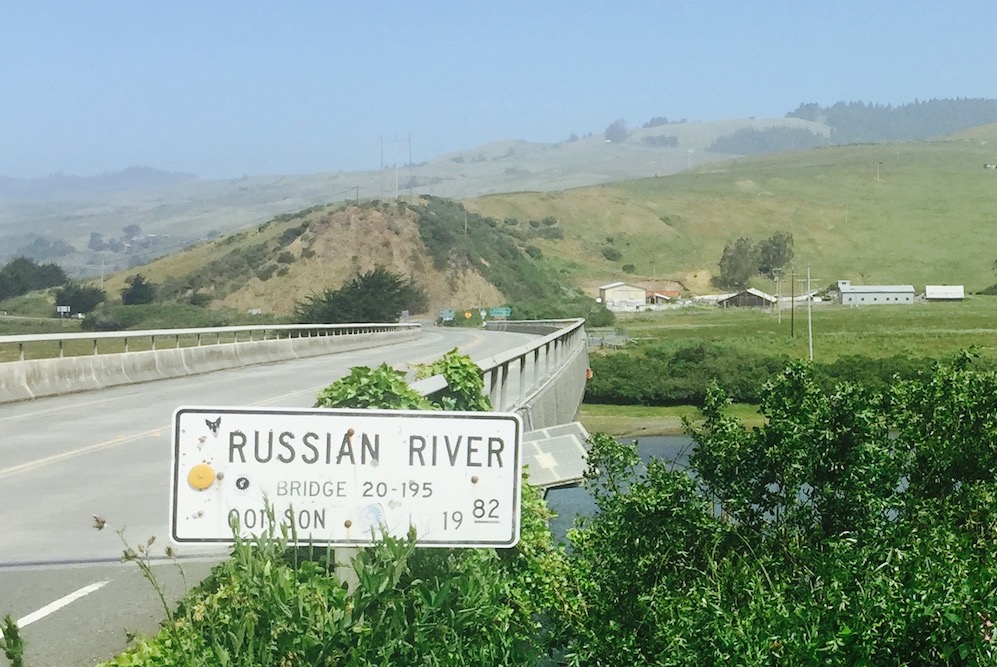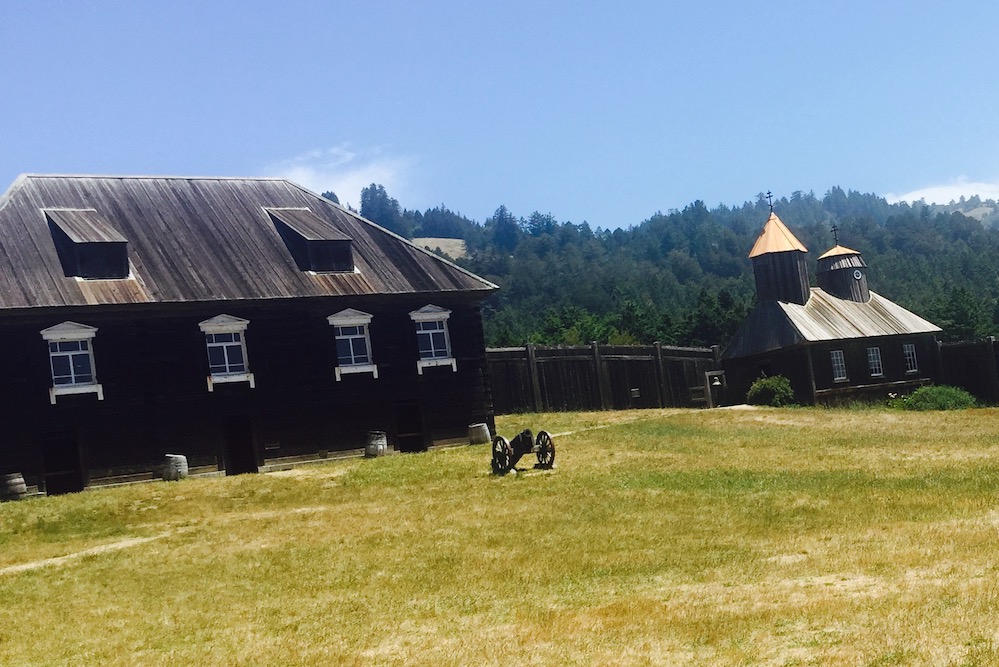
Photo by Joe Mathews.
Take my guilty plea, Mr. Mueller. Because this Californian has been colluding with the Russians.
To be sure, I didn’t subvert any elections. But one recent week this spring, when my colleagues were out of the office, I snuck away to visit that most alluring of Russians, the Russian River, which seductively winds its way through Mendocino and Sonoma counties on its way to the Pacific. Perhaps the special counsel, who knows the territory from a stint as U.S. Attorney for Northern California, will cut me some slack in sentencing.
To travel the length of the Russian—as I did at this moment of maximum paranoia about all things Russian—is to be reminded that California and Russia are too intertwined for scandal to keep us apart.
For one thing, Russian interference in California is older than the state itself. For another, our state’s defining industries, entertainment and technology, have themselves been defined by Russian emigres from songwriter Irving Berlin to Google’s Sergey Brin.
But at heart our connection is mystical. California and Russia are two of this planet’s greatest puzzles. Each territory is considered too vast, and its people too strange, to ever be truly understood. Winston Churchill famously called Russia “a riddle wrapped in a mystery inside an enigma”; anyone who has ever watched Californians try to govern themselves knows that those words apply to the Golden State too.
On my excursion, I approached the river from the south, via Sebastopol, a town named for a late 1850s fistfight so brutal it was compared to the British siege of the Russian seaport of Sevastopol during that decade’s Crimean War.
I made my way through Bodega Bay, which Russia’s earliest colonizers to California used as a port. Then I crossed over the river on my way up the sumptuous Sonoma coast to Fort Ross, a Russian settlement established in 1812.
That was an eventful year for invasions, with Britain fighting the United States, and the Russians repelling Napoleon—a victory so great that the Russian composer Tchaikovsky’s overture about it is still performed each summer at the Hollywood Bowl, accompanied by fireworks and the USC Trojan Marching Band. Fort Ross was established by the Russian-American Company, a trading firm backed by the Russian crown, to provide food for its Alaskan operations. The Russians’ presence gave the river its name.
But like so many who would move to California, the Russians found the beautiful place harder than they’d anticipated. The cost of living was high, Southern Californians (then Spanish) were hostile, and the fur trade proved unprofitable. Still, the Russians made a historic mark, constructing the first windmill and first ship ever built in California, and becoming the first Europeans to record California’s distinctive flora.
The Russians in California sought to salvage their colony by enlisting the support of the new Mexican government in the 1830s, on the condition that Russia would recognize Mexico. But the tsar wouldn’t agree to that condition, and so in 1841 the Russians sold off Fort Ross like a failed startup. The buyer, John Sutter, had everything of value hauled back to his home in Sacramento, a move that prefigured modern California’s centralized tax policy.
Ever since, the cover story has been that the Russians abandoned California to the Mexicans and then the Americans. But California actually preserved the old Russian colony as a state park in 1906. The state has since added three times to the property, and even re-routed Highway 1 around it.

Fort Ross State Historic Park. Photo by Joe Mathews.
In recent decades, with tens of thousands of tourists visiting from the motherland, Fort Ross sees far more Russians than it ever did under Russian rule. Among the guests have been Russian generals, the speaker of the Russian senate, and the Patriarch of the Orthodox Church. And then there are the Americans who use the fort to play Russian. On the day I visited, fourth graders from a Santa Rosa school, dressed in 19th-century Russian garb, occupied the fort, claiming to have seen ghosts in one building while cooking carrots over an open fire.
The Russian presence here doesn’t merely honor the past. It also seeks to shape the future. From Fort Ross, I drove back to the mouth of the river in tiny Jenner. On a beautiful bluff, I saw the unmistakable hammer-and-sickle flag of the Soviet Union flying over a restaurant called Russian House #1.
Inside I met the restaurant’s founders, Tatiana Ginzburg and Polina Krasikova, Russians who split their time between Sonoma County and St. Petersburg, which is where the Russian-American Company was headquartered.
When I started asking questions, Ginzburg, a psychologist, answered with questions of her own. She lamented that we didn’t have a few days to talk, so we could connect over a “long Russian story.” So here’s the short version: The restaurant, which in 2015 replaced an Indian joint called Sizzling Tandoor, is less a restaurant and more a project for those interested in civilization, quantum physics, transpersonal psychology, self-actualization, and “a space for dialogue between two great cultures and peoples.”
The place also challenges capitalist and imperialist structures. There is no menu. You are not greeted by a server; the Russian food, home-cooked, is laid out buffet-like. And there are no prices and no bill—you pay what you think is right, in a bowl by the door.
All these practices are designed to get people to stop, think, and ultimately experience a change in consciousness, she said.
Ginzburg says her work draws from the 20th-century Russian mystic G.I. Gurdjieff, who taught that many humans live their lives “asleep” and thus behave as unconscious automatons who are easily manipulated into thoughtless horrors, like world war. But through dedicated work, humans can ascend to a higher state of consciousness and become more fully human.
Gurdjieff was a composer of music as well as a spiritual master, and the restaurant has a piano and a harp, and hosts events and performances. It also contains two chessboards, and various puzzles. The word for puzzle in Russian is “Golovolomka,” she noted, “which means something that will break your head.”
“We try to see the fundamental things here, and our intention is to create a new type of being,” she said, adding as she left for a rebirthing: “There is a connection here on the river, between Russia and this place.”
After perusing the restaurant library, with titles from Le Carré to Dostoyevsky, I thought about connections as I continued my river trip. There is a magic in the scale of the Russian landscape or the giant trees of the Armstrong Redwoods State Natural Reserve. Both Russia and California love the arts. The dachas there might be the large Wine Country estates here, and both exist uneasily amid the poverty of people who do the farm work. Then there’s the joy of carousing. Russia loves its vodka, and the Russian River runs on wine.
Through Guerneville, Forestville, and Rio Nido, my mobile phone didn’t have service. But on the radio, NPR reported on the investigation into Russian interference in American democracy. The news was framed as an ongoing invasion of our country.
Such news is maddening, and put me in mind of Russian novelist Leo Tolstoy’s War and Peace, the massive novel of that French invasion back in 1812, when Russia met California. “Those whom God wishes to destroy he drives mad,” Tolstoy wrote.
He also wrote about love and enemies: “Some one dear to one can be loved with human love; but an enemy can only be loved with divine love.” Tolstoy believed that when we muster love for our enemies, when we see God in even those we might kill, we reach a level of love that “nothing, not even death” can shatter.
I don’t love authoritarians who attack democracy and innocent people. But Putin is not Russia, and America is not Trump. And at least I was questioning myself and my consciousness, just as the women at the Russian House #1 advise. “All we can know is that we know nothing,” Tolstoy wrote. “And that’s the height of human wisdom.”
I still don’t know what I was thinking when I reached Healdsburg and walked to a beach along the river. A man had let his dog run into the water, which somehow inspired me to remove my shirt and shoes and wade into the Russian in my blue jeans.
The water was warmer and deeper than I had expected.




Send A Letter To the Editors